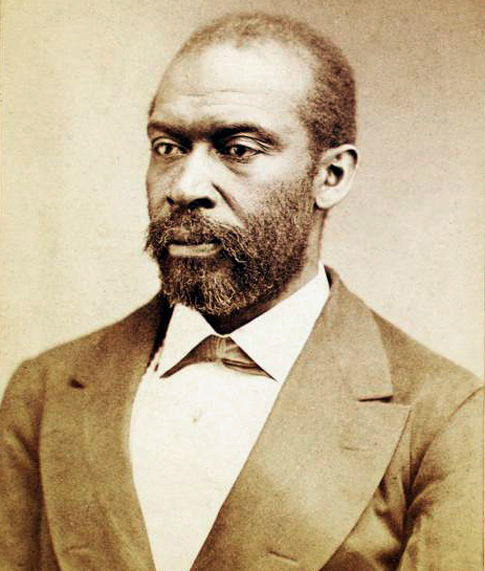Nancy Weston
Bertha Hansbury
William Donnegan
Rehearsal for a chorus line at the Apollo Theater
Image Speak
Eliza Brooks
Aida Overton Walker
George Walker
A. Means
Aida Overton Walker
First Graders
First Black School in Kansas
Palmer Institute Faculty Members
Lucille Berkely Buchanan
The Graduate
Class of 1891
Clara Belle Williams
Sarah Lewis
Mary Henrietta Graham
Students from Covert School
Josephine Baker
Josephine Baker
Soldier
Vintage Miss
Vintage Sisters
Murray Bros. Printing Co.
State of Virginia's First
Orpheus M McAdoo
Black Herman
Griffin Sisters
George Walker
William D Foster
See also...
Authorizations, license
-
Visible by: Everyone -
All rights reserved
-
89 visits
Thomas Morris Chester: The Lone Black Reporter of the Civil War


Born 1834, Harrisburg, Pennsylvania. The son of an escaped slave and oyster salesman, Chester’s childhood was relatively secure and very progressive. Attending college in Pittsburgh, he first became interested in the concept of African colonization and traveled back and forth between Liberia and the U.S. after graduation in 1853. Liberia was actually where Chester got his first taste of journalism, writing and editing for the “Star of Liberia” in Monrovia, the nation’s capitol.
The escalation of the Civil War prompted Chester to move back and join the Union efforts; he helped recruit and raise the 54th and 55th Massachusetts Colored troops regiments. Later, he would lead two Black regiments into battle for the famous Gettysburg Campaign in 1863. This was the first time Pennsylvania issued weapons to African-Americans.
From August 1864 to the end of the Civil War, Chester worked as a war correspondent for the Philadelphia Press, becoming the first Black war correspondent working for a major daily paper.
After the end of the war, Chester moved to England to study law and went on to become England’s first Black barrister (lawyer). During the 1870s, Chester moved back to the U.S. and settled in Louisiana, working as the brigadier general of the militia and also the superintendent of schools in 1875.
In 1892 embittered by Jim Crow laws and in ill health, he returned to his hometown, where he died of a heart attack a year later. He was buried in a segregated cemetery in Harrisburg, Pennsylvania.
Newseum, Sharon Shahid
Image: Cheyney University of Pennsylvania
The escalation of the Civil War prompted Chester to move back and join the Union efforts; he helped recruit and raise the 54th and 55th Massachusetts Colored troops regiments. Later, he would lead two Black regiments into battle for the famous Gettysburg Campaign in 1863. This was the first time Pennsylvania issued weapons to African-Americans.
From August 1864 to the end of the Civil War, Chester worked as a war correspondent for the Philadelphia Press, becoming the first Black war correspondent working for a major daily paper.
After the end of the war, Chester moved to England to study law and went on to become England’s first Black barrister (lawyer). During the 1870s, Chester moved back to the U.S. and settled in Louisiana, working as the brigadier general of the militia and also the superintendent of schools in 1875.
In 1892 embittered by Jim Crow laws and in ill health, he returned to his hometown, where he died of a heart attack a year later. He was buried in a segregated cemetery in Harrisburg, Pennsylvania.
Newseum, Sharon Shahid
Image: Cheyney University of Pennsylvania
- Keyboard shortcuts:
Jump to top
RSS feed- Latest comments - Subscribe to the comment feeds of this photo
- ipernity © 2007-2025
- Help & Contact
|
Club news
|
About ipernity
|
History |
ipernity Club & Prices |
Guide of good conduct
Donate | Group guidelines | Privacy policy | Terms of use | Statutes | In memoria -
Facebook
Twitter
